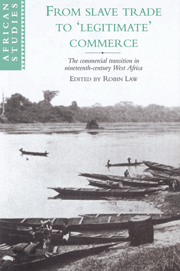 From Slave Trade to 'Legitimate' Commerce
From Slave Trade to 'Legitimate' Commerce Published online by Cambridge University Press: 21 September 2009
During the Atlantic slave trade, the desert-edge functioned as an interface not only between the Sahara and Sudan, but also between their economic systems and those of the Senegambian coast. It influenced the slave trade's operation, its price structure, and its impact on the far interior. When abolition came, its impact also was refracted through this desert-edge prism. This essay studies the nature of this impact as measured in the social, political and economic changes which followed in its wake.
The essay is divided into four sections. The first sketches existing perspectives on the ending of the slave trade in West Africa, and situates those specific to the ‘interior’ in historiographical context. Key to this is the work of Claude Meillassoux. His arguments frame the analysis in the second section, which questions established interpretations of price behaviour and gender preference in the slave trade. In the third section, revisionist interpretations are suggested, based largely on work by Martin Klein, Richard Roberts, James Webb, John Hanson, Paul Lovejoy and David Richardson, and myself. In the fourth and final section, I return to the larger picture of the impact of abolition, and offer some observations of what this revisionist analysis means for this ongoing debate, especially with regard to A. G. Hopkins' influential concept of a ‘crisis of adaptation’.
Historiography
In thirty years of debate over the impact of the ending of the Atlantic slave trade on West Africa, the theme of continuity or change has remained central.
To save this book to your Kindle, first ensure no-reply@cambridge.org is added to your Approved Personal Document E-mail List under your Personal Document Settings on the Manage Your Content and Devices page of your Amazon account. Then enter the ‘name’ part of your Kindle email address below. Find out more about saving to your Kindle.
Note you can select to save to either the @free.kindle.com or @kindle.com variations. ‘@free.kindle.com’ emails are free but can only be saved to your device when it is connected to wi-fi. ‘@kindle.com’ emails can be delivered even when you are not connected to wi-fi, but note that service fees apply.
Find out more about the Kindle Personal Document Service.
To save content items to your account, please confirm that you agree to abide by our usage policies. If this is the first time you use this feature, you will be asked to authorise Cambridge Core to connect with your account. Find out more about saving content to Dropbox.
To save content items to your account, please confirm that you agree to abide by our usage policies. If this is the first time you use this feature, you will be asked to authorise Cambridge Core to connect with your account. Find out more about saving content to Google Drive.